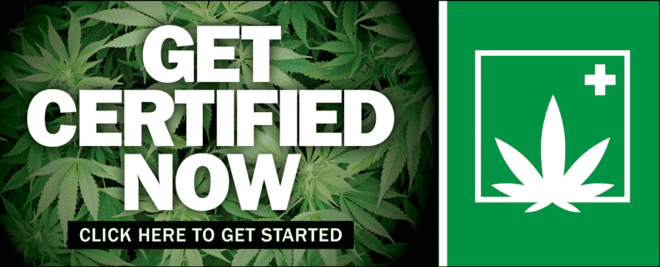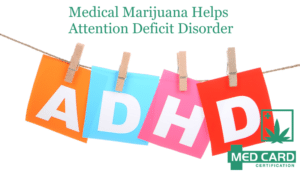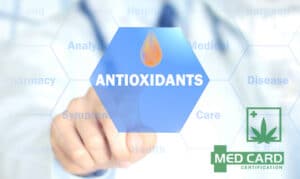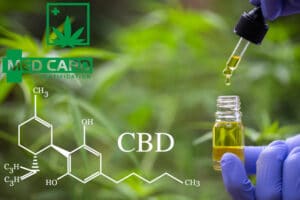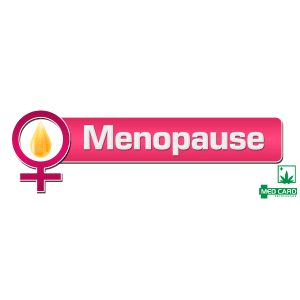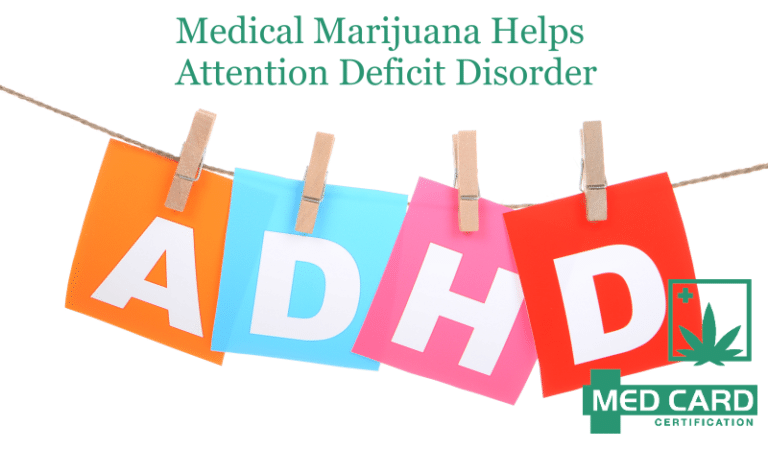
How Medical Marijuana Helps Treat ADD/ADHD
- Medical marijuana offers a safe and effective treatment for ADD & ADHD
- How medical marijuana improves symptoms
- Studies on medical marijuana
- How medical marijuana is used to treat ADD/ADHD
- Best medical marijuana strains for ADHD
Is medical marijuana a safe and effective treatment for ADHD? The fact of the matter is that a lot of whether or not a patient can successfully use marijuana or other cannabis-infused products to treat ADHD depends on the patient, the cause of the condition, the product/formula being used, and the method of delivery.
For many years now ADHD (attention deficit hyperactivity disorder) has been treated with pharmaceuticals like Ritalin and Adderall. Although these medications can often help with focus and attention deficits, they are rife with unwanted side effects. Sleeplessness, lethargy, suppressed appetite, and stunted growth are the main issues with the administration of these meds. Eventually, over time ADHD sufferers may develop a resistance to the drugs, leading to increased doses, decreased efficacy, and the risk of potential long-term abuse.
For these compelling reasons, many individuals afflicted with ADHD are turning to medical marijuana for relief from ADHD symptoms.
There is plenty of anecdotal evidence suggesting medical marijuana’s validity as an alternative medication for controlling ADHD. Family doctor Elizabeth Spaar from Verona Pennsylvania referenced her own pediatric patients when discussing the administration of medical marijuana for childhood ADHD, and stated: “They’ve seen improved performance in school and happier and calmer kids at home.”
Let’s explore how Patients are using medical marijuana to treat ADD/ADHD.
What is ADHD?
ADHD is considered in the medical community to be one of the most common mental health disorders and is statistically most prevalent in children. Adults can also receive a diagnosis of ADHD, although it may present with slightly different symptoms.
Presently, there is a lack of understanding around ADHD, and many people remain undiagnosed. Sadly, in the U.S., fewer than one in five adults with ADHD receive a diagnosis or seek treatment for the condition.
Many of us experience a lack of focus or inattentive behavior from time to time. However, those with ADHD live with crippling distractions, making it almost impossible to function normally at home, in school, at work, or in social situations.
It’s commonly believed that ADHD simply makes children behave in a hyperactive manner with an inability to focus. However, it can also manifest as restlessness, memory problems, impatience, talking constantly, lack of social and organizational skills, impulsivity, as well as avoidance of certain activities and duties.
Children, in particular, can shift from being unable to focus to being completely obsessed with an activity.
Sadly, if left unchecked, ADHD can lead to anxiety, depression, learning disabilities, bipolar disorder, and substance abuse.
Adderall and Ritalin both increase dopamine levels in the brain, which can temporarily help with focus. However, as we mentioned earlier, these medications come with a host of unpleasant side effects.
How does medical marijuana help treat ADHD?
At present, relevant data is limited on precisely how marijuana effects and ADHD patients. Until more research occurs, the question, “Does marijuana help with ADHD?” cannot be properly answered. However, many marijuana doctors are confident that their patients are benefiting from the use of cannabis.
Larry Maucieri, Ph.D. and contributing author for Psychology Today wrote: “At least anecdotally, many patients with ADHD mention its positive impact on focus as part of the draw in using it.”
Like the drugs mentioned above, medical marijuana also triggers a release of dopamine in the brain without severe side effects. For example, marijuana is far less likely to cause loss of appetite or sleeplessness.
Brain activities are regulated by molecules known as neurotransmitters. These include dopamine and serotonin, both known to control emotions, memory, movement, impulsivity, attention, and reward circuits. Individuals suffering from ADHD are often coping with extremely low levels of these vital neurotransmitters.
There is speculation that a deficient endocannabinoid system (ECS) may contribute to the onset of ADHD. If this is the case then the issue could be addressed with the administration of cannabis. Endocannabinoids produced by our own bodies are very similar to the phytocannabinoids produced in the resinous flower clusters of the female cannabis plant.
In some ADHD patients, cannabinoids such as CBD and THC have similar effects to anandamide. This naturally occurring endocannabinoid is responsible for affecting levels of dopamine and serotonin in the brain. CBD, in particular, is known to mimic the effects of anandamide to some extent.
Cannabinoids also have the potential to alleviate anxiety, insomnia, and depression, which are common symptoms among ADHD patients.
Studies on medical marijuana’s effects on ADHD
There has been some research regarding the link between ADHD and the endocannabinoid system. Much of the research has been focused on the prevention of substance abuse.
Researchers tested a synthetic cannabinoid medication on ADHD patients in a trial undertaken in 2017. Although the findings of the study were not considered to be statistically significant, and the number of participants was small, the results were favorable and the patients showed slight improvements in their ADHD symptoms.
The study revealed that some adults with ADHD, after cannabinoid use, experienced a lessening of symptoms with no discernable cognitive impairment. The results also indicated that adults experience fewer side effects than children.
Some clinical research was conducted recently, with an emphasis on brain activity in ADHD patients as well as individuals with addiction issues. The researchers determined that both sets of patients suffered from low dopamine levels. The administration of CBD is believed to have increased those levels significantly.
One advocate for cannabinoid therapies studied the relationship between the endocannabinoid system and ADHD. Dr. David Bearman discovered that the dopamine deficiency found in ADHD patients could potentially be reversed with the application of CBD.
Dr. Bearman wrote:
“Cannabis appears to treat ADD and ADHD by increasing the availability of dopamine. This then has the same effect but is a different mechanism of action than stimulants like Ritalin (methylphenidate) and Dexedrine amphetamine, which act by binding to the dopamine and interfering with the metabolic breakdown of dopamine… The most accepted theory about ADHD rests on the fact that about 70 percent of the brain’s function is to regulate input to the other 30 percent,” Dr. Bearman says. “Basically the brain is overwhelmed with too much information coming too fast. In ADHD, the brain is cluttered with and too aware of all the nuances of a person’s daily experience.”
Also, the Journal of Substance Use and Misuse published an article in 2013 reporting that ADHD patients who used CBD experience fewer hyperactive and impulsive behaviors.
How medical marijuana is used to treat ADHD
There are several efficient methods for delivering cannabinoids into the system. Some of these are appropriate only for adults such as smoking and vaping. However, there are also some good delivery options for children.
- Smoking cannabis flower (marijuana or hemp) is most certainly the fastest way to find relief from symptoms of ADHD, as the effect is almost instantaneous. The downside of this method is that it is hard on the lungs and may result in coughing and a dry throat.
- Vaping flower or concentrates is another super-fast way to relieve symptoms of ADHD. The effects are powerful and long-lasting. Whether or not vaping is better for the lungs than smoking is debatable.
- Tinctures and concentrates are an extremely non-invasive way to get cannabinoids into the system. The effects take a little longer to kick in, but are long-lasting. This is the most precise method of dosing, as most tinctures and concentrates come with a measuring dropper or syringe.
- Cannabis-infused edibles are a delicious way to employ the healing effects of cannabinoids and thus are a good option for children. A wide variety of edibles is available such as baked goods, gummies, hard candy, chocolates, and beverages. The effects are strong and long-lasting.
- Transdermal cannabinoid patches are also available at many medical marijuana dispensaries. Transdermal patches have a reservoir of cannabinoids and are applied to the skin like a bandage. The cannabinoids enter the bloodstream through the skin over a period of hours.
For people just starting a medical marijuana regime for ADHD, it’s wise to start with very small doses. This is especially true when using THC which in children can be intoxicating in dosages as small as a couple of milligrams.
Patients and parents also have the option of using hemp-derived CBD products. Anyone can buy online and in local shops without a medical marijuana card.
Best medical marijuana strains for ADHD
Cannabis is bred in a wide variety of strains. Each strain offers different levels of THC, CBD, and other cannabinoids. While some marijuana strains are high in THC, others are higher in CBD or CBG and low in THC. This gives adults options as to what level of intoxication they will experience when smoking, vaping, or cooking with cannabis flower.
Here are some of the medical marijuana strains used to treat ADHD.
Green Crack is high in cannabinoids. It won’t take much of this highly stimulating strain to help patients mentally focus on the task at hand. This one tops the list for ADHD relief.
Orange Sherbet is a tasty indica-dominant strain with sweet high notes. This is a go-to for many ADHD patients, as it induces deep relaxation and takes the edge off hyperactivity.
Raspberry Cough is a sativa strain that sustains an uplifted mood. It’s great for ADHD symptoms and anxiety, and many patients who use this strain report an increase in productivity and focus.
Sour Diesel is definitely one of the most popular strains for treating ADHD. It manages to keep patients’ minds engaged and active.
Goo strain is a potent, relaxing indica. It’s perfect for ADHD patients who are still taking Adderall or Ritalin, as it can offset the side effects of those medications.
Conclusion
More research is required to further ascertain the benefits of medical marijuana for the treatment of ADHD. However, thousands of ADHD patients are finding relief from their symptoms with cannabis.
As more clinical and anecdotal evidence rolls in, it’s just a matter of time before marijuana is fully embraced by the masses and the medical community as a safe and effective treatment for ADHD.

Sign Up for Medical Cannabis Today!
For potential patients, if you’re ready, we make it easy to connect with a medical marijuana doctor nearby or online. If you are interested in getting certified, please fill out the MMJ patient registration form below and press submit to get started. See if you qualify today!

MedCard Registration Form




